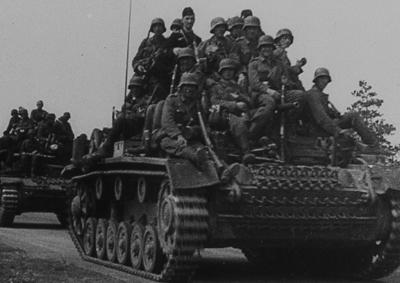Directed by Frank Capra (uncredited) and Anatole Litvak (uncredited)
Special Services Division INFORMATION FILM #5
US Theatrical version
Shortly after the Japanese attack on Pearl Harbor, director Frank Capra enlisted as a major in the U.S. Army. In February 1942, Capra was assigned to work directly under Army Chief of Staff, George C. Marshall, to create a series of films to show American soldiers the reason for U.S. involvement in the war.
Though Capra’s assignment was to make documentary films, he claimed that he had never seen one. He decided to view a print of Leni Riefenstahl’s Triumph Of The Will (1934) as his first example. Capra stated that Triumph Of The Will “fired no gun, dropped no bombs. But as a psychological weapon aimed at destroying the will to resist, it was just as lethal.” Capra was challenged by Riefenstahl’s film and was determined to create an American response to it. Capra’s idea for the documentary series was to “let the enemy prove to our soldiers the enormity of his cause---and the justness of ours.” He would use the enemy’s speeches, films, newsreels, and newspaper articles to help make the case for U.S. involvement in the war. From this idea, a series of seven documentary films entitled Why We Fight was created.
The fifth film in the series, The Battle of Russia, attempts to paint a picture of the heroic struggle of the Soviet people against the Nazi invaders. The film opens with a general history of Russia and its people. It continues with the Nazi invasion of the Soviet Union, beginning in June 1941 and the brutal Siege of Leningrad. It then concludes with the Nazi’s historic defeat at the Battle of Stalingrad.
In order to justify the Western Allies' alliance with the Soviet Union, The Battle of Russia omitted many facts that might have cast doubt on the “good guy” status of the Soviets. There is only a passing reference to the Nazi-Soviet Non-Aggression Pact of 1939, and there is absolutely no mention of the Soviet invasion of Poland in 1939, the occupation of the Baltic States in 1940, nor the Winter War with Finland, 1939-1940.
Why We Fight was a success with the troops, and the films were subsequently released to the general public. It is estimated that at least 54 million Americans had seen the series by the end of the war.
Jeffrey Bickel
U.S. War Department, Special Services Division, Army Service Forces. Producer: Frank Capra. Screenwriters: Julius J. Epstein, Philip G. Epstein, Robert Heller, Anatole Litvak (uncredited), John Sanford (uncredited), and Anthony Veiller (uncredited). Editor: William Hornbeck. With: Anthony Veiller (narrator).
35mm, b/w, 81 min.
Preserved by the Academy Film Archive and UCLA Film & Television Archive from two 35mm nitrate prints. Laboratory services by The Stanford Theatre Film Laboratory, Film Technology Company, DJ Audio, Audio Mechanics.






 Mobile Navigation
Mobile Navigation

